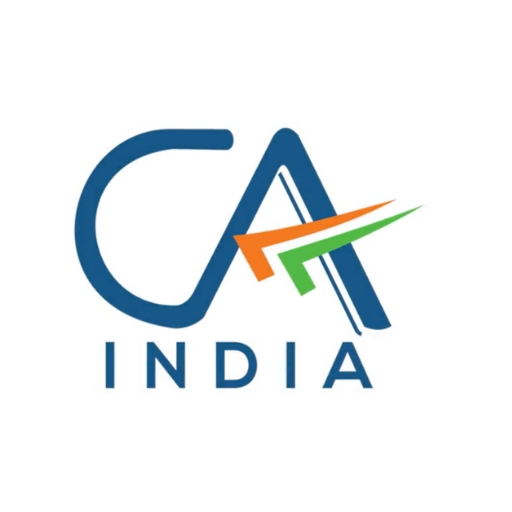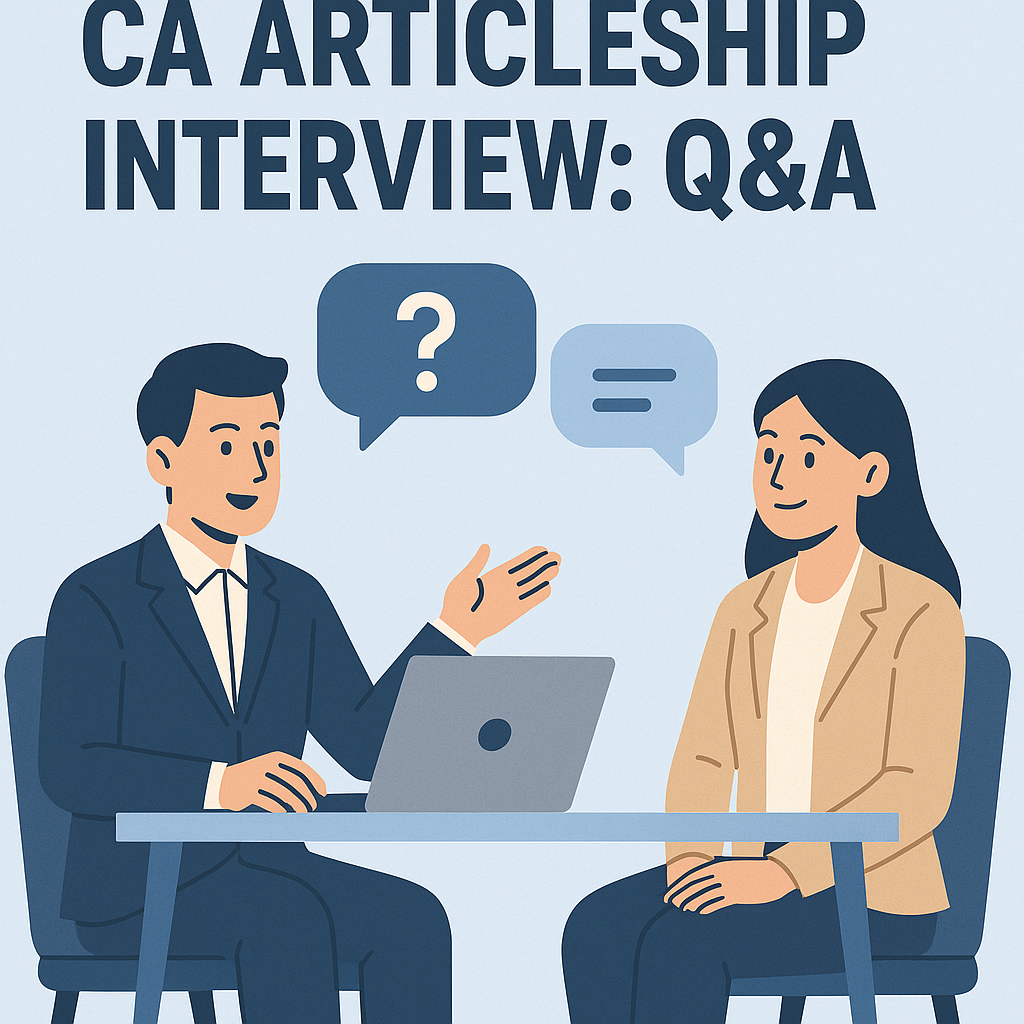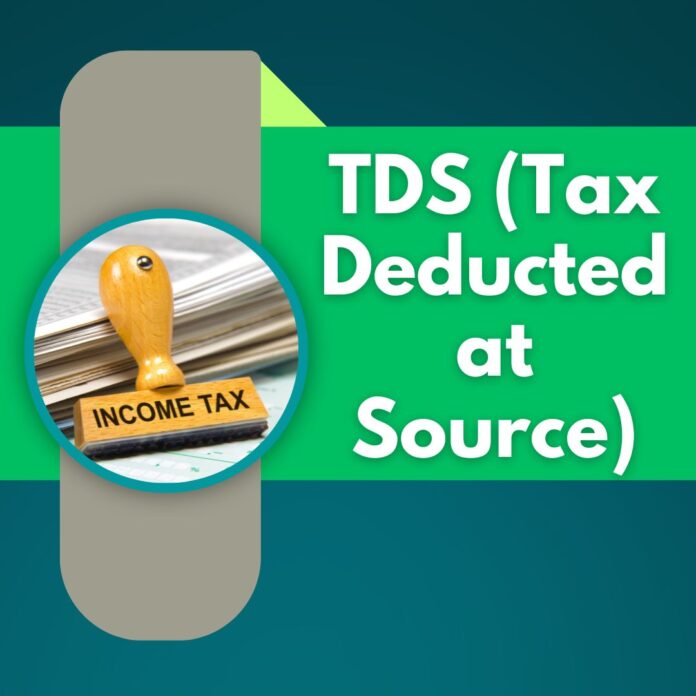HR Round Questions for CA Articleship Interview: Comprehensive Guide with Sample Answers
Preparing for a CA Articleship interview is one of the most important steps in your Chartered Accountancy journey. While technical knowledge is crucial, the HR round plays an equally vital role in determining your selection. It helps interviewers understand your personality, mindset, career goals, and how you will fit into the organization’s culture.
In this blog, we cover commonly asked HR round questions in CA Articleship interviews with suggestive, professional answers. These will help you project confidence, clarity, and commitment during your interview.
1. Tell Me Something About Yourself
This is often the first question in any interview. The key is to present a balanced introduction covering your academics, achievements, skills, and career aspirations without sounding rehearsed.
Sample Answer:
“My name is [Your Name]. I am currently pursuing Chartered Accountancy and have cleared [mention level]. Academically, I have always been inclined towards subjects like Accountancy, Taxation, and Finance. Alongside my studies, I actively follow economic updates and GST changes, which keeps me aligned with real-world applications of CA. I am a disciplined learner, quick to adapt, and keen to contribute meaningfully in areas like statutory audit and taxation. My long-term goal is to specialize in audit and advisory while building strong technical and professional expertise.”
2. Why Did You Choose CA?
Interviewers want to test your clarity of purpose and passion for the profession.
Sample Answer:
“I chose CA because it is one of the most respected professions in India, offering in-depth knowledge of accounting, taxation, and law. The rigor of the course ensures not only technical expertise but also analytical and problem-solving skills. I wanted a profession where I could continuously learn, stay updated with business and regulatory developments, and contribute significantly to organizations and the economy. CA perfectly matches these aspirations.”
3. Why Statutory Audit / Internal Audit / Direct Tax?
This question checks whether you understand the role you are applying for.
Sample Answer for Statutory Audit:
“I prefer statutory audit because it provides a comprehensive exposure to financial statements, accounting standards, and internal controls. It develops analytical skills and offers a strong foundation in understanding how businesses function. This exposure will help me build a robust technical base in my CA journey.”
Sample Answer for Internal Audit:
“Internal audit interests me because it involves understanding processes, risk assessment, and ensuring compliance with company policies. It allows me to analyze and improve business systems, which aligns with my interest in problem-solving and advisory roles.”
Sample Answer for Direct Tax:
“I find direct tax appealing because it combines technical knowledge with practical application. It involves continuous learning due to frequent amendments, and I enjoy keeping track of these changes. It also provides opportunities to work on planning and compliance aspects, which are critical for businesses and individuals.”
4. Difference Between Statutory Audit and Internal Audit
This is a direct knowledge-based question.
Sample Answer:
“Statutory audit is a legally mandated audit of financial statements to ensure their fairness and compliance with accounting standards and laws. It is conducted by external auditors and is compulsory for specified companies. Internal audit, on the other hand, is not mandatory for all organizations. It focuses on evaluating internal controls, operational efficiency, and risk management, usually carried out by internal teams or appointed auditors. In short, statutory audit ensures compliance, while internal audit focuses on strengthening processes.”
5. Why Should We Hire You?
This is your chance to market yourself professionally.
Sample Answer:
“You should hire me because I bring a strong academic foundation, commitment to learning, and adaptability to new challenges. I am disciplined, detail-oriented, and capable of working under deadlines. I am also enthusiastic about contributing to the firm’s goals while building expertise in audit and taxation. My eagerness to learn and my ability to quickly grasp technical concepts make me a good fit for this role.”
6. What Are Your Strengths and Weaknesses?
Be honest yet professional.
Sample Answer:
“My key strengths are discipline, analytical ability, and adaptability. I work well under deadlines and can quickly adjust to changing work environments. One area I am working on is public speaking—I sometimes feel nervous addressing large groups, but I have been actively improving this by participating in discussions and seminars.”
7. Where Do You See Yourself in 5 Years?
This tests your career vision.
Sample Answer:
“In five years, I see myself as a qualified Chartered Accountant with expertise in audit and taxation. I aspire to take on managerial responsibilities, guiding teams and contributing to impactful projects. My goal is to continuously learn and grow within the profession while building strong professional credibility.”
GST Accountant Interview Q&A Handbook
8. Why Big4/Big6? Why KPMG and Not Other Big4? Why GT/BDO and Not Big4?
This question checks your awareness of the firm’s positioning.
Sample Answer for Big4:
“I prefer the Big4 because of the exposure they provide to diverse industries, global practices, and large-scale audits. The structured training and challenging assignments are ideal for developing strong technical and professional skills.”
Sample Answer for KPMG:
“I prefer KPMG because of its culture of innovation, emphasis on continuous learning, and strong global network. Its focus on technology-driven solutions in audit and advisory matches my interest in modern practices.”
Sample Answer for GT/BDO:
“I prefer Grant Thornton/BDO because they offer excellent exposure in mid- to large-sized clients while ensuring more responsibility early in the career. I believe the balance of work-life, growth opportunities, and strong learning environment makes them a great platform for Articleship.”
9. How Will You Manage Work Pressure?
Sample Answer:
“I believe time management and prioritization are key to handling pressure. I maintain discipline in planning tasks, breaking them into manageable parts, and staying focused on deadlines. I also believe in maintaining a calm mindset, which helps me deliver quality work under pressure.”
10. How Will You Manage CA Final Studies with Work?
Sample Answer:
“I understand that balancing work and studies is challenging, but I am committed to maintaining both. I will utilize weekends and early mornings for focused study, while ensuring full dedication to work during office hours. With proper time management and consistency, I am confident I can balance both effectively.”
11. Will You Be Able to Work Long Nights?
Sample Answer:
“Yes, I am aware that during peak seasons, long working hours may be required. I am ready to put in the necessary effort as I see this as an opportunity to learn more, handle challenging situations, and grow professionally.”
12. Are You Comfortable with Travelling? Are You Willing to Relocate?
Sample Answer:
“Yes, I am comfortable with travelling and relocating if required. I see this as an opportunity to gain exposure to different industries, clients, and working environments, which will help me in my professional growth.”
The HR round in a CA Articleship interview is designed to test more than just your academic knowledge. It evaluates your clarity of thought, motivation for pursuing CA, adaptability, and long-term career vision. By preparing for these commonly asked questions with structured, professional answers, you can present yourself as a confident and committed candidate ready to excel in your Articleship journey.
Introduction:
Briefly explain that while the HR round tests personality and mindset, the technical round evaluates a candidate’s knowledge of accounting, auditing, taxation, GST, and law.
Sections:
- Audit
- What is Audit?
- What is Vouching & Verification?
- Difference between Statutory and Internal Audit.
- What are Assertions?
- What is Materiality?
- Types of Audit Opinions.
- Key Audit Matters (KAMs).
- Applicability of CARO 2020.
- Recent changes in Schedule III.
(Answers explained in simple but professional terms.)
- Accounting
- Important Accounting Standards (AS 2, 9, 10, 29, etc.).
- Basic journal entries for common transactions.
- Depreciation methods and rates.
- Treatment of provisions and contingencies.
- Taxation (Direct Tax)
- TDS & TCS provisions (limits and rates).
- Due dates for TDS payments and returns.
- Section 80 deductions (major ones).
- Income Tax Act 2025
- Depreciation provisions under Income Tax Act.
- GST
- Section 17(5) – blocked credits.
- Reverse Charge Mechanism (RCM) – applicability.
- GST return filing basics.
- Law
- Key provisions of Companies Act 2013.
- Applicability of CARO, 2020.
- Audit-related sections (e.g., Sec 139 – appointment of auditors).
- Excel & Practical Knowledge
- Commonly used functions: VLOOKUP, XLOOKUP, Pivot Tables.
- Importance of Excel in audit/tax work.
Conclusion:
Highlight the importance of being updated with Union Budget 2025-26 and regulatory amendments, as technical questions often include current changes.
📥 Download PDF for the most commonly asked questions for CA Articleship interviews.




